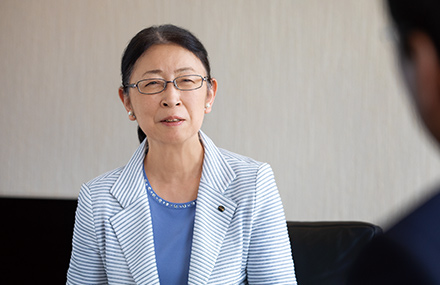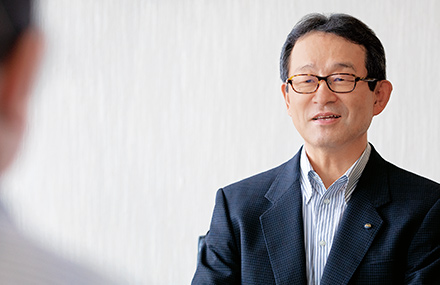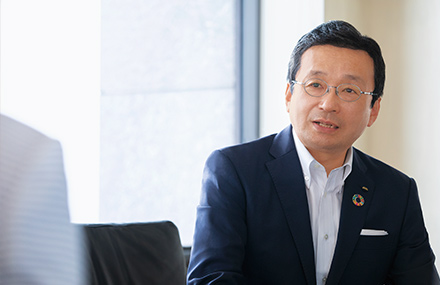SPECIAL FEATURE 02
Three-Way Dialogue: The Human Resources and Corporate Value of ITOCHU
![[photo]](img/an12_im01.jpg)
We asked CAO Fumihiko Kobayashi and outside Directors Atsuko Muraki and Masatoshi Kawana about key issues facing ITOCHU in its pursuit of sustainable growth, particularly in terms of human resource strategy.
Kobayashi: First, allow me to thank you both sincerely for the wide-ranging insight and guidance you provide as members of the Board of Directors. Also, thank you once again for sharing your candid views regarding ITOCHU today.
Muraki: Discussions in the Board of Directors are lively, and ideas shared by outside Directors are also being actively incorporated into managerial decisions. When we held discussions concerning uniform supply issues, I was glad that we were able to find common ground after the outside Directors came together and commented on issues that were difficult to notice internally.
Kawana: Input from outside Directors were also what led to revisions in the executive remuneration system. Outside Directors have the duty of pointing out issues that are difficult to mention or change for those working within the Company.
Kobayashi: I am thankful to have received your enlightened insight as outside Directors, even when it was stern, because I think it led to stronger governance.

“With a little ingenuity, I think we can
encourage further participation from
female employees in a way that is natural.”
Atsuko Muraki
Outside Director
Assumed a position as member of the Board of Directors at ITOCHU in June 2016, after serving as Vice Minister of Health, Labour and Welfare. Served as Chairman of the Governance and Remuneration Committee in FYE 2019, leading discussions regarding proper response toward revisions to the Corporate Governance Code. Ms. Muraki has also contributed many helpful proposals and suggestions concerning internal control, compliance, work-style reforms, and sustainability.
Muraki: I remember a case in which outside Directors expressed their opinions persistently. Mr. Okafuji encouraged us to express ourselves, saying, “I just want you to speak freely.” This was a good idea because it led us to share a variety of opinions, which enabled us to know the different opinions that we all held. Furthermore, the Board actively incorporated outside Directors’ opinions when establishing The 8th Company. ITOCHU also gives outside Directors like us the opportunity to interact with young employees. We found that these young employees indicated awareness of internal issues and often spoke of the “problem with vertical organizations.” Based on their input, we made proposals urging more effective use of human resources. In response, the Company adopted the policy of promoting measures to invigorate human resources when establishing The 8th Company. I was surprised at the overwhelming speed at which the Company implemented this decision.
Kobayashi: Perhaps this quick transition from decision-making to implementation is a characteristic of ITOCHU. It is meaningless just to increase the number of outside Directors if they aren’t effective. To ensure the effectiveness of our outside Directors, we provide them with opportunities to exchange their views with employees and executives, inspect business sites in Japan and overseas and meet face to face with the chairpersons and presidents of major Group companies to increase their understanding of our businesses and the issues that we face. Through these measures, our outside Directors independently participate in the management of the Nomination and Governance and Remuneration Committees.
Kawana: We may not be full-time Directors, but we still visit ITOCHU with considerable regularity. As we meet with executives and employees more and more, many things become clear. When I was in North America for an overseas business inspection the other day, I had the privilege of seeing employees genuinely enjoying their work. Thanks to this sight, I gained firsthand understanding of the effectiveness of ITOCHU’s wide-ranging human resource policies.
Kobayashi: On the topic of human resource policies, we must increase labor productivity to compete with other general trading companies while maintaining a small but highly skilled labor force. For this reason, we have long considered human resource strategies to be corporate growth strategies and have pioneered a series of work-style reforms, including our morning-focused working system. To raise labor productivity, all of our employees must have opportunities to demonstrate their advanced abilities and be healthy, motivated, and satisfied with their jobs. All members of ITOCHU are currently working together to become the “best company in Japan.” This goal was established because an ITOCHU employee who passed away from cancer two years ago said, “To me, ITOCHU is the best company in Japan,” before passing. At this employee’s funeral, Mr. Okafuji vowed, in tears, that he would make ITOCHU the best company in Japan, no matter what. This vow from top management materialized into our Support Measures for Balancing Cancer Care and Work, which we adopted in August 2017. At the heart of these measures is an awareness that we must be a good company for our employees to achieve sustainable growth moving forward. (→ Human Resources)![]()

“I became convinced that I could
contribute in terms of
health management and healthcare.”
Masatoshi Kawana
Outside Director
Served as Vice President of Tokyo Women’s Medical University Hospital, in addition to other positions. He assumed a position as member of the Board of Directors at ITOCHU in June 2018. Contributed to the further development of governance at ITOCHU as a member of the Governance and Remuneration Committee in FYE 2019. Mr. Kawana used his expertise to provide many useful proposals and suggestions in the fields of health management and healthcare-related business.
Kawana: As a doctor, I brought an unusual perspective with me when I assumed my role as an outside Director in 2018. When approached about the position, I wondered how my experience could contribute to corporate management. However, I realized that the goal of becoming the No. 1 Health Management Company is one of the basic policies in the current medium-term management plan and, after hearing ITOCHU’s ideas regarding improving employee health and developing environments in which they can fully demonstrate their abilities, I became convinced that I could contribute in terms of health management and healthcare. ITOCHU did not stop with its adoption of its Support Measures for Balancing Cancer Care and Work; it has adopted a system of individual evaluation that considers personal achievements to balance medical treatment and work. The Company’s efforts in this regard extend beyond its employees; ITOCHU is broadly expanding its perspective to include society as it contributes to the treatment of cancer through actions such as its decision to form an academic and industrial alliance with Nagoya University with the goal of furthering cancer treatment research.
Muraki: I was also confused when approached about the position in 2016 because I had been working at the Ministry of Health, Labour and Welfare for a long time and was unfamiliar with corporate management. At the time, ITOCHU was discussing its goal of becoming a company that allows its diverse human resources, including women or employees with time limitations caused by nursing care obligations, to fully demonstrate their abilities. I immediately realized that my role under these conditions was to utilize my connections related to labor management, and promote human resource advancement and revitalizing organizations. Organizations under the previous general trading company model made decisions under a pyramid system, which seemed to take an enormous amount of time. I proposed that, moving forward under an amoeba-like management system, we must redistribute authority and improve communication, changing organizations in a way that allows young employees to further demonstrate their capabilities. This idea continues to inspire steady change and has been reflected in initiatives related to The 8th Company. However, diversity continues to be a major issue. The Division Companies have strong authority in terms of personnel administration, and I get the impression that they are still holding on to some old ideas. Perhaps headquarters and the Human Resources and General Affairs Division should take the initiative and promote further diversity. With a little ingenuity, I think we can encourage further participation from female employees in a way that is natural.
Kobayashi: We recently increased our number of outside Directors, bringing the total to four out of 10 Directors overall. Furthermore, we have two female Directors now that Ms. Nakamori has joined us as an outside Director. (→History of the Board of Directors) Additionally, we promoted to the position of Executive Officer a female employee who has been with ITOCHU since she was hired as a new graduate, bringing the total number of female Executive Officers to two. However, only about 10% of our employees in career-track positions are female, and we cannot say that our ratio of females in management positions is high. It can be said that we have relatively little experience hiring females for career-track positions, but I believe we should respond to this point seriously.
Kawana: I believe that, when viewing diversity from the perspective of the varied experiences it brings, it is undeniable that we need to do away with vertical organizations that have long overstayed their welcome and implement cross-Division Company and division transfer. On the other hand, my talks with on-site employees, who are very proud of their statuses as professionals in their respective fields, have led me to the realization that we should not rashly move employees without first giving them the opportunity to work in the same division for a few years and accumulate expertise on specific products. We should take these feelings from our young employees to heart and steadily supply them with a good balance of opportunities for both input and output.
Muraki: It is said that when human resources combine new outside experiences with their previous experiences, it produces a “multiplier effect” that causes large increases in ability. However, if the previous experience is not sufficiently specialized, no multiplier effect will be produced and any resulting increase in ability will only be equivalent to the sum of the experience combined. As Mr. Kawana said, honing specialized expertise is important. When nurturing employees, I believe it is important to be aware the balance between pursuing specialties and seeking outside challenges that will provide this multiplier effect.
Kobayashi: Societal demand for us to contribute to the resolution of social issues through our core business is rising in response to a variety of developments, including the UN’s adoption of its SDGs, the enactment of the 2016 Paris Agreement, and expansion in ESG investment. In April 2018, we formulated our Basic Policy on promoting Sustainability, incorporating ESG perspectives into our material issues. (→Sustainability) In September 2018, we were selected for inclusion in the World Index of the Dow Jones Sustainability Indices, an international ESG index, for the sixth consecutive year. Additionally, we received the Gold Class award in the 2019 SAM Sustainability Awards, which are conducted by RobecoSAM AG and commend excellent companies from each industrial sector that are implementing initiatives related to sustainability. The Gold Class award, which we won for the fourth consecutive year in 2019, is bestowed upon top companies in each sector. This is an extremely high honor, given that out of 66 companies worldwide to have received this honor, only five have been Japanese.
Muraki: From the standpoint of ESG, I believe that we are implementing excellent initiatives. I recently visited Via Transportation, Inc., and METSA FIBRE OY and felt that their initiatives have a lot of potential. This potential is not limited to ESG in the narrow sense; I believe that we can expect these investments focused on raising value for all of society while creating systems that allow other businesses to develop by absorbing expertise gained through these investments. ITOCHU possesses an abundance of excellent management resources, so I believe that if it works on strengthening Group companies while maintaining an awareness concerning ESG, the level of ESG for the entire ITOCHU Group will also rise.
Kawana: The Support Measures for Balancing Cancer and Work that were mentioned earlier, simultaneously create social value and economic value for ITOCHU. This creation of value ultimately allows ITOCHU to contribute to the achievement of the SDGs. In terms of environmental (the “E” in “ESG”) considerations, we are promoting initiatives in relation to the Task Force on Climate-related Financial Disclosure. We announced a fundamental policy of not operating new businesses related to thermal coal or conducting new development of coal-fired power generation. In addition, we participated in the TCFD Consortium, which was jointly established by the Ministry of Economy, Trade and Industry, the Ministry of the Environment, and the Financial Services Agency and provides a forum for TCFD-supporting companies to conduct discussions. Furthermore, we are implementing a variety of advanced initiatives, including coal business analyses using a number of scenarios based on the recommendations of TCFD.
Kobayashi: As we steadily respond to social issues, I believe that human resources in the “S” (in “ESG”) will play a central role in continuously expanding ITOCHU’s corporate value. ITOCHU maintains that its creation of company environments that are strict but rewarding to work in leads to labor productivity befitting the No. 1 general trading company. We also aim to become a good company for society as a whole by returning the results that this labor productivity produces to our employees and shareholders. We aim to create cycle in which students searching for work upon graduation will look at us more favorably, enabling us to continuously hire more superior graduates. I want to keep this cycle turning steadily as we move forward. ITOCHU was selected as the top company in all industries or as the No. 1 general trading company in a variety of employment rankings. I believe that this is evidence of our status as a sustainable company that students have called “worth betting your life on.” Furthermore, from an ESG perspective, I think that sustainability is precisely what makes a “good company.”
Kawana: Currently, many traditional companies are facing pressure to implement major reforms in the face up unprecedented technological innovation. In the past, students may have felt secure if they could enter a large company, but I think that students are now selecting companies based on a stricter point of view that considers whether or not they can adapt to a variety of changes moving forward. The perception of ITOCHU as a company with a clear vision that is capable of change under these conditions is likely what leads to these kinds of assessments.
Muraki: In terms of change, I would have to say that the evolution of our corporate governance is most striking. ITOCHU’s approach of listening to people’s opinions, including those of its outsider Directors, has become particularly strong over the last few years. Systems that allow change, including changes to nominations and compensation, to be triggered from outside the Company are firmly built in. I believe that outside Directors like us need to play a major role during times like the present, when a company is being led by strong leadership. I will continue to exert pressure when necessary to ensure that those working within the Company do not become “yes men.”
Kawana: I agree. Moving forward, I want to continue to act as a liaison that enables senior management to properly absorb the opinions of its employees.
Kobayashi: You have shared opinions for our sustainable development, focusing primarily on people. Our corporate message, “I am One with Infinite Missions,” is a modernization of sampo yoshi (good for the seller, good for the buyer and good for society), the management philosophy of Ohmi merchants. Believe it or not, the term sampo yoshi, which is the cornerstone of sustainable growth at ITOCHU, is said to have been created when later scholars rephrased the business philosophy of Chubei Itoh Ⅰ, ITOCHU’s founder. We can confidently say that it is our original philosophy that describes the spirit upon which we were founded. ITOCHU already makes determinations regarding material issues based on this philosophy of sampo yoshi and uses these determinations to establish concrete goals. Moving forward, I would like to aim for sustainability by instilling this spirit, which has been continuously passed down since our founding for more than 160 years, in each of our employees and ensuring that they share it with each other and apply it in their work. Thank you for taking the time out of your busy schedules to participate today.

“We can confidently say that sampo yoshi is our original philosophy that describes
the spirit upon which we were founded.”
Fumihiko Kobayashi
Member of the Board
Senior Managing Executive Officer, CAO
